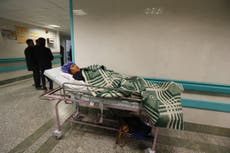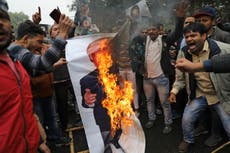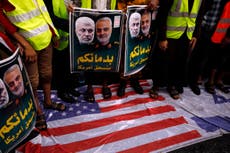I watched the Iran-Iraq war unfold as a child – now I feel like I’m reliving it
What is happening in Iran now is not simply ‘news’ for us in the diaspora – it’s the repetition of decades-old trauma

As children in the Seventies and Eighties, our playtimes or our scrapping were frequently disrupted by a cry from our parents: “Children! Shhhhh! Iran’s on the news IRAN IS ON THE NEWS” – and we would hush and skid into the living room to watch. Our parents were glued to the screen, barely blinking, not wanting to miss a single second of the all-too-brief glimpses of what was going on in their country.
Back then, English was still a new language to them, and us children were called on to translate parts of the report they were unable to understand.
Back in the late Seventies, when we first came to England, the only access my parents had to Iran was these reports on the television. The fighting, mass demonstrations and chants of “marg bar Amrica!” (death to America!) were featured daily in the news.
Ayatollah Khomeini’s fearsome face filled the screen, our parents rooted to the spot while my brother and I waited for the relief of the “Iran news” ending so we could go back to whatever game we were playing or fight we were having.
I was a seven-year-old when the phone call came from Iran that my 19-year-old uncle had been shot dead on a Tehran street during a demonstration. My uncle Masood was my favourite uncle, the best out of eight – a lot of adoration from a kid. He was shot in the back by an off-duty police officer as he retreated from an altercation.
If you don’t know my story of being exiled from Iran, it’s all in my book, A Beginner’s Guide to Acting English (out now in all good charity shops). My father, Hadi Khorsandi, was a popular writer and a strong voice of dissent after the people’s revolution of 1979. We couldn’t go back because he was one of the many dissidents who had been put on the Ayatollah’s Death List. This was very different to a “bucket list”, more of an “our-head-in-a-bucket” list.
It’s safe to say the Iranian government are not fans of my father’s satire or poetry. In 1984, the Ayatollah himself approved the assassination of my father in London, but by great good fortune, an official of the regime informed Scotland Yard of the plot and it was foiled.
We were granted asylum in the UK after this. We’d always planned to go back, but the regime didn’t change, and as my brother and I grew, England became our home, our country. We watched Grange Hill, read Enid Blyton, and watched our parents’ ashen faces when they couldn’t get hold of family in Tehran after an air raid during the Iran-Iraq War.
Adopting and being adopted by a new country doesn’t mean you ever stop feeling like you belong to your motherland. We have never been able to be carefree enough to take our freedom and comfort in the UK for granted. Never. As children, we saw the effects that living in Iran had had on other children in our family. A 12-year-old cousin came to visit when the borders were reopened during the Iran-Iraq War. We took her to Ealing Cricket Club on bonfire night, keen to show her the traditions of our adopted culture. She disappeared when the first volley of bangs went off as the fireworks started. I looked around for her; she had thrown herself on to the ground and was lying face down covering her head with her hands.
What is happening in Iran now is not simply “news” for us in the diaspora. The week has been like being thrown back into the Seventies and Eighties, but this time it’s me saying “Shush! Children SHHH! Iran’s on the news!” And once again it is so bleak that I feel wretched about what my aunts, uncles and cousins are having to endure while I sit in my comfy home writing pithy tweets.
The killing of Soleimani put Iran on the front pages again, but before that, we watched helplessly as more than 1,500 anti-government protesters in Iran were shot dead – most of them young, like my uncle Masood. All those families as devastated as mine was. In Iran, if you protest against leaders, criticise them, you don’t get trolled on Twitter – you get murdered by the state.
I spoke to my father’s sister this week. She is grieving for her son, who died recently. My father is not able to go to Iran and comfort his sister, and she is not allowed to leave and visit us. This separation from loved ones is another of the devastating, inhuman punishments meted out by Iran’s rulers.
After Soleimani’s death, his daughter Zainab spoke to a huge crowd declaring there would be “dark days” for those responsible and that their homes would be “flattened”.
In contrast, my grandparents, under Sharia law, were able to pardon my 19-year-old uncle’s killer, saving him from execution, saying “we don’t want his parents to suffer as we do”.
This kind of compassion, of forgiveness, is not an easy path to take. It’s a harder path than retribution – but the only one which leads to peace.







Join our commenting forum
Join thought-provoking conversations, follow other Independent readers and see their replies